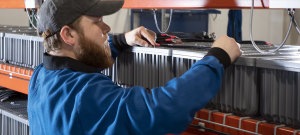DOE Seeds U.S. Zinc Battery Tech Company With $400 million
A new zinc-halide battery technology stores renewable energy at a lower cost and environmental impact than lithium-ion cells.
“Today, the U.S. Department of Energy’s (DOE) Loan Programs Office (LPO) announced a conditional commitment to Eos Energy Enterprises, Inc. (Eos) for an up to $398.6 million loan guarantee for the construction of up to four state-of-the-art production lines to produce the “Eos Z3™,” a next-generation utility- and industrial-scale zinc-bromine battery energy storage systems (BESS) in Turtle Creek, Pennsylvania.”
U.S. department of Energy
Loan Programs Office

That’s significant news for Eos Energy and the development of alternative battery technologies for grid storage. Eos Energy’s zinc-halide batteries have the potential to be a game-changer in the renewable energy sector due to their lower long-term cost (10 year vs. 20 yr. life) compared to traditional lithium-ion batteries. Add’l advantages: Minimal environmental impact compared to lithium ion, and they don’t spontaneously combust!
- Loan from the US Department of Energy: Eos Energy has received a substantial loan of nearly $400 million from the US Department of Energy (DOE). This indicates strong support and confidence from the government in the potential of their zinc-halide battery technology.
- Alternative to Lithium-Ion Batteries: Eos Energy specializes in zinc-halide batteries, which are considered an alternative to lithium-ion batteries. These batteries are being developed with the aim of providing more cost-effective energy storage solutions for renewable energy sources like wind and solar power.
- Conditional Commitment: The loan is referred to as a “conditional commitment.” This means that the DOE is providing financial support to Eos Energy on the condition that they meet certain milestones or requirements related to their battery technology development and deployment. This approach helps ensure that taxpayer funds are invested wisely.
- DOE’s Focus on Battery Technologies: This marks the first time the DOE’s Loan Program Office has extended such a commitment to a battery manufacturer specializing in alternatives to lithium-ion batteries. Previously, the DOE had primarily supported lithium-ion manufacturing efforts, battery recycling initiatives, and other climate-related technologies. This shift in focus suggests a growing interest in diversifying the battery technology landscape for various applications, including grid storage.
- Clean Energy and Grid Storage: The development of advanced energy storage technologies is crucial for the integration of renewable energy sources into the grid. Efficient and cost-effective energy storage solutions, like Eos Energy’s zinc-halide batteries, can help stabilize the grid, reduce reliance on fossil fuels, and accelerate the transition to a cleaner and more sustainable energy system.
This investment from the DOE is a significant step in advancing the deployment of alternative battery technologies, and it reflects the growing importance of energy storage solutions in the context of addressing climate change and transitioning to a greener energy future.



